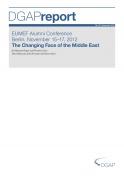Foreword
When Mohammed Bouazizi set himself on fire in Tunis on December 17, 2010, no one could have imagined that this act of protest would eventually lead to the resignation of Tunisia’s president Zine El Abidine Ben Ali on January 14, 2011, after 23 years in power. This, in turn, inspired protests and paved the way for uprisings in several other Arab countries, with varying results. In Egypt, mass protests led to the toppling of long-time president Hosni Mubarak and the beginning of a rocky transformation process; in Libya, Colonel Muammar Gaddafi was ousted by a military intervention; in Syria, the ongoing civil war that started in March 2011 has cost tens of thousands of civilian lives; in Morocco, King Mohamed VI introduced small-scale reforms from above to channel public unrest; Bahrain witnessed mass protests, which have been suppressed by brute force; and even in the oil-rich Gulf monarchies, signs of dissatisfaction and protest can be observed.
The Arab world has always been a heterogeneous region with clear differences in social fabrics, development statuses, political systems, freedoms, alliances etc. This heterogeneity has become even more evident since the uprisings took place. In its formal and informal sessions, the Alumni conference of the EU-Middle East Forum (EUMEF) shed light on different facets and outcomes of the Arab uprisings. It explored different domestic scenes, highlighting the new and old actors who are directing the course within the respective countries, their agendas and level of influence pertaining to the democratization process and political reforms, and the degree to which they respond to the populations’ wishes. The conference also addressed how backlashes and developments running counter to the main demands of the uprisings can be counterweighed and reversed. Special attention was given to the economics of the uprisings. At the heart of the protests in the region were demands for social justice, decent education, health, and social security systems, and an end to massive poverty, unemployment, corruption, and nepotism – to name the countries’ most alarming economic and social woes. Discussions therefore scrutinized how these serious deficits were addressed (if they were), the type of reforms adopted, and what economic options were available to the rulers in the first place (against the background of a global neo-liberal order and the reality that neediness might hinder an emancipation regarding a free economic orientation). Finally – since one of the major byproducts of the uprisings is a very likely change of regional and international power relations and dynamics – the conference tackled the geo-political implications of the uprisings. The impact of this reality, combined with the emergence of new respective political forces and rulers, on relations vis-à-vis regional and international actors such as Turkey, Israel, Iran, the US, and the EU were at the center of the debate.
The reunion gathered 79 promising junior and senior experts and activists from the MENA region (Middle East and North Africa) and the EU, all alumni of EUMEF’s International Summer Schools and New Faces Conferences over the past 15 years. With the exception of keynote speaker, the conference consisted entirely of alumni speakers, discussants, and participants. These had the chance to explore cooperation opportunities and present their own projects and initiatives. We genuinely believe that these intense platforms for dialogue, learning, and networking (bringing together different perspectives and views from Europe and the MENA region) are essential when attempting to make sense of the current historically unique and very complex developments in the Arab region. Only when grasping the different interests and needs of the various sides can constructive solutions and engagement be developed. EUMEF therefore attaches immense value to its network and is very grateful for the huge interest in EUMEFs work expressed by the alumni.
Dina Fakoussa, Head of EUMEF Christian Achrainer, Program Officer at EUMEF

